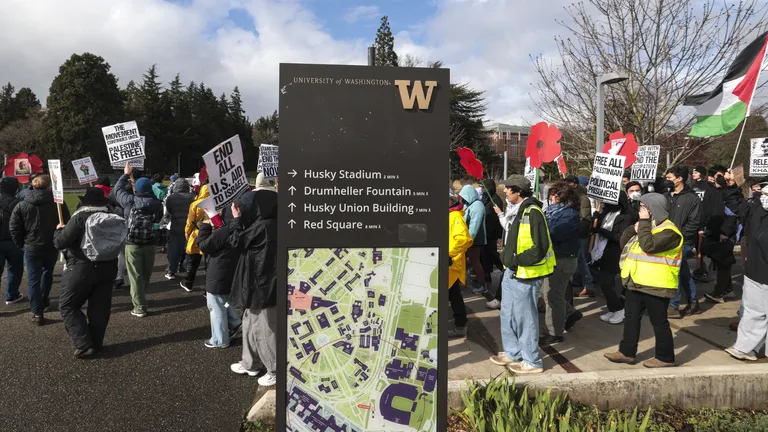SEATTLE — The University of Washington has suspended 21 students following their arrest during a pro-Palestinian protest that escalated into the occupation of a major campus building. The students, who were taken into custody earlier this week after occupying the Interdisciplinary Engineering Building, have also been banned from all university campuses, according to a statement released by the school Wednesday. In addition to the students, thirteen non-students who were arrested during the demonstration have been barred from the university’s Seattle campus.

The protest, which began Monday evening, was aimed at pressuring the university to sever its financial and research connections with Boeing, a company with deep philanthropic and institutional ties to the school. Demonstrators cited Boeing’s role as a key supplier to the Israeli Defense Forces, framing the protest as an act of solidarity with Palestinians in Gaza. The action included a symbolic renaming of the building in honor of Shaban al-Dalou, a teenage engineering student reportedly killed alongside his mother in an Israeli airstrike near a hospital in Gaza.
University officials reported what they described as “significant damage” to the occupied building and its equipment, along with fires set in multiple dumpsters outside the premises. The Seattle Fire Department responded to the blazes while campus police coordinated the removal of protestors from the building. The university did not immediately detail the extent of the damage or the cost of repairs, but emphasized the disruption to academic and research operations.
Boeing’s financial influence on the university was a central grievance for the protestors. According to The Seattle Times, the aerospace giant has donated over $100 million to the university since 1917, including $10 million toward the very engineering building that was occupied. In recognition of that contribution, Boeing was granted naming rights to the building’s second floor—a point of contention for students who argue that corporate sponsorship links the institution to military violence abroad.
The U.S. Department of Education announced on Tuesday that it had launched an investigation into the protest, with a particular focus on whether federal civil rights laws were violated. The department’s Task Force to Combat Anti-Semitism released a statement urging the university to implement enforcement actions and policy changes to prevent future disruptions. In response, a university spokesperson confirmed that UW is cooperating fully with the investigation, expressing confidence in the school’s adherence to federal law.
University spokesperson Victor Balta acknowledged that concerns over bias, antisemitism, and Islamophobia have prompted institutional changes since last fall. As part of an effort to address escalating tensions on campus, the university has created a Title VI coordinator position, consolidated compliance operations into a new Civil Rights Compliance Office, and expanded incident reporting protocols. Efforts have also been made to strengthen relationships with both Jewish and Muslim communities at the university.
In March, the University of Washington’s Board of Regents overwhelmingly rejected a proposal to divest from companies with business ties to Israel, underscoring the administration’s position on maintaining longstanding corporate partnerships. That decision has drawn criticism from activist groups, who argue that the university’s financial entanglements contradict its stated commitments to human rights and social justice.
As disciplinary proceedings move forward, the suspensions have added to a growing national debate over how universities handle politically charged demonstrations, especially those linked to the Israel-Gaza conflict. For now, the University of Washington finds itself at the center of that controversy, balancing campus safety, civil rights compliance, and the voices of a deeply divided student body.



